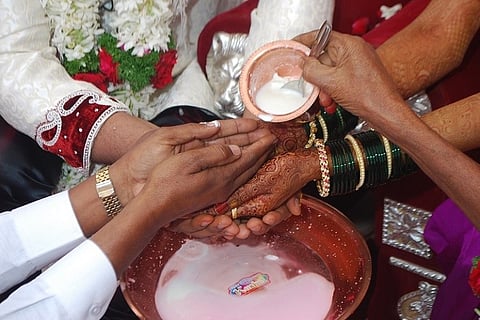

In the wake of Gali Janardhana Reddy’s daughter’s wedding vulgarity, attention has once again been focused on the Karnataka government’s move to regulate wedding expenditure. While there has been a furore each time the proposed bill comes up, what has gone almost unnoticed, is that such a law already exists, and the government has proposed an overhaul, with one of the amendments focused on levying a luxury tax on lavish weddings.
In 2014, MLA KR Ramesh, a vocal critic of Reddy’s extravagant wedding for his daughter, introduced a private member bill, which was put on hold due to strong opposition from sections of society.
Following this, the Law Ministry, which had been tasked with looking into a draft law, submitted its report in January 2015 recommending amendments to the existing Karnataka State Marriages (registration and miscellaneous provisions) Act 1976, which is largely unimplemented. Karnataka State Marriages (Registration and Miscellaneous Provisions) Act.
“This act has to be amended as most of its provisions are out dated,” said Uma Mahadevan, Principal Secretary to Government, Department of Women and Child Welfare.
So, what did the Law Commission recommend?
The proposed bill has updated its definition of a simple wedding to reflect existing financial realities.
In the existing 1976 Act, the expenditure cap is Rs 5,000, which is a grossly outdated figure in today’s economy.
Under the amendment, a “simple marriage” would be one where the expenditure does not exceed Rs 5,00,000 and restricts the number of guests to 1,000, including the families of the couple.
The new bill states that expenses must be filed if the wedding expenditure exceeds the said amount, which is as follows:
10% of the amount exceeded for expenditure between Rs 5-10 lakh
Rs 50,000 penalty plus 25% tax on expenses between Rs 10-20 lakh.
Rs 3 lakh penalty plus 40% tax on expenses between Rs 20-50 lakh
Rs 15 lakh penalty plus 60% tax on excess expenditure above Rs 50 lakh
Through the “luxury tax” so collected, the draft proposes the creation of the “Mangalya Nidhi” fund, through which mass marriages and inter-caste weddings would the luxury tax on extravagant weddings. The “Mangalya Nidhi” would be monitored by the Director of the Department of Women and Child Welfare.
The bill also proposes the creation of an inspecting force to oversee the marriages performed in the state and report any violations to the Registrar of Marriages.
“Establishment of such an inspecting force is absolutely necessary because thousands of marriages take place all over the state daily and if such an inspecting force is not established, it is trite, that the intendment of law cannot be translated into reality,” the recommendation states.
The bill also defines the functions of the inspecting force which includes collection of evidence during the ceremony itself as it is possible that the parties who breach the provisions of the act may destroy evidence after the ceremony.
The decision on the strength of the force and the financial aspects are not mentioned in the bill as it vests the responsibility in the hands of the state government.
Why was the bill opposed?
The bill intended to levy taxes on weddings and make it mandatory for wedding hall owners to obtain licenses.
It also proposed that wedding halls cannot charge more that Rs 50,000 per day and expenditure on Invitations cannot exceed Rs 7,000.
“However, the recommendations made by the Law Ministry, had scrapped the compulsion on wedding hall owners to obtain licenses, the debate had led to the bill being put on hold,” Uma said.
However, on November 25, after the flak faced by the Reddy wedding, the Law and Parliamentary Affairs Minister TB Jayachandra had said that the government is considering reviving the bill as the government believed that the public was against lavish spending on weddings.
“As the winter session is still in progress, it remains uncertain whether the bill is on the government’s agenda. Once the session is over, we will know for sure,” Mahadevan added.